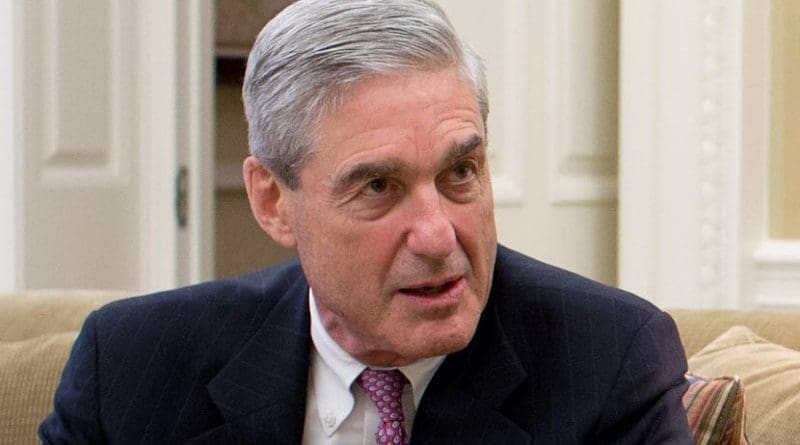Did Mueller Leave A Trap For Trump? – OpEd
By Graham J Noble*
As everyone waits for special counsel Robert Mueller’s final report on his Russia investigation to be made available, all attention is on the four-page letter by Attorney General William Barr summarizing Mueller’s conclusions. While the special counsel found no evidence that President Donald Trump or anyone associated with him conspired or cooperated with Russians, Democrats have seized upon one specific sentence in the letter. Mueller’s motive for including this particular sentence in his report is worth analyzing, since it will surely mold the way the president’s enemies use the report once they receive it.
The attorney general’s summary quotes the special counsel as saying: “While this report does not conclude that the president committed a crime, it also does not exonerate him.” The statement applies specifically to the question of whether President Trump obstructed justice. Mueller came to this conclusion after a “thorough factual investigation,” as Barr’s summary quotes the report.
Mueller Oversteps His Prosecutorial Duty?
The special counsel declined to make a “traditional prosecutorial judgment” in this matter and left it to the Department of Justice to decide if the president’s actions met the standards for an obstruction-of-justice charge. Barr and Deputy Attorney General Rod Rosenstein determined that “the evidence developed during the Special Counsel’s investigation is not sufficient to establish that the president committed an obstruction-of-justice offense.”
Mueller and his team investigated obstruction – and all other matters within the scope of their authority – as prosecutors. Their task was to gather and analyze evidence, interview witnesses, and make recommendations on who should face charges and for what. Otherwise, they make declination decisions, recommending that no charges be brought.
These decisions — prosecution or declination — are based purely on the available evidence and as such do not require any clarifying statements, such as “this report … does not exonerate [Trump].” It simply was not necessary to make this observation. Prosecutors either recommend charges, or they do not, without adding judgmental statements.
Former FBI Director James Comey found himself in hot water when he announced, in 2016, that Hillary Clinton would face no charges but included in his public statement that the former presidential candidate had been “extremely careless” in her handling of classified information. Protocol dictates that an individual who will not be charged with a crime should not have his or her character besmirched. Comey was not acting as a prosecutor, though, and found himself in the frustrating position of having to exonerate Clinton because he knew that the Justice Department had no intention of charging her.
Leaving Open the Door for Impeachment
By choosing to point out that his report does not exonerate the president in the matter of obstruction, Mueller similarly has overstepped. The mere fact that he chose to defer to the DOJ demonstrates that he was unable to make a firm declination decision, even though he did not believe he had enough evidence to recommend a charge. By definition, then, he was not exonerating the president – so why put that in writing?
It is probably misjudging Mueller to suggest that he decided to emphasize his non-exoneration purely out of pique, that he was taking a swipe at Trump in retaliation for all the times the president had disparaged Mueller’s motives and his special counsel team.
The more likely answer is that Mueller purposefully included this sentence in his report in order to leave the door open for the impeachment of the president. It is entirely possible that Mueller knew the DOJ would not find sufficient cause to determine that Trump had obstructed justice. Mueller himself was unable to do so, after all.
The word “exonerate” is loaded, though, and Mueller clearly could not bring himself to apply it to Trump because it would have closed the book, so to speak. In legal terms, exoneration means a suspect is discharged of all liability – thus, in effect, proven innocent.
Is a person innocent until proven guilty beyond a reasonable doubt? Mueller was unable to conclude that Trump was guilty of obstruction beyond a reasonable doubt but stopped short of declaring him innocent. In doing so, Mueller has ensured that Democrats retain a reason to doubt the president’s innocence. Even though the attorney general has cleared the president, congressional Democrats have been handed by Mueller the key to a potential article of impeachment.
Until the full Mueller report – or as much of it as can be made public – is available to read, it is difficult to speculate if more will come of it. Mueller had an opportunity to put a long and highly damaging episode in the past. With a single sentence, he chose to keep this national wound open and further the divisiveness that continues to afflict the nation.
*About the author: Political Correspondent & Satirist at LibertyNation.com. Raised and inspired by his father, a World War II veteran, Graham learned early in life how to laugh and be a gentleman. After attending college, he decided to join the British Army, where he served for several years and saw combat on four continents.
Source: This article was published by Liberty Nation

